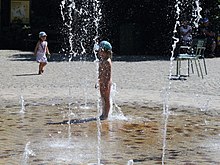heat
The term heat is used for a temperature that is perceived as unusually high .
term
Often heat is also referred to as warmth , which is physically and technically incorrect: Heat is a state that is described by a state variable , temperature . In contrast, the term heat does not express a state, but a change in temperature. Accordingly, heat is not measured by the temperature, but by the thermal energy transferred , i.e. a process variable that changes the state .
One speaks of heat, for example, when the air temperature is high , especially in the tropics and deserts , but also in subtropics and temperate latitudes in the respective summer months . The term is used very generally as an expression for unusually high air temperatures, meteorologically referred to as a heat anomaly .
In meteorology in the middle latitudes, days with a maximum daily temperature of over 25 ° C are referred to as a summer day , at over 30 ° C as a hot day (hot day, tropical day) and at over 35 ° C as a desert day . An unusually long phase of consecutive hot days is also known as a heat wave . These can cause great damage and, in extreme cases, even in temperate latitudes, cause a summer of the century . Heat waves and droughts are often linked, but there are also hot spells with high precipitation and droughts with moderate temperatures.
The perceived heat is more an expression for the perceived temperature , which depends on the measured air temperature and also on the wind speed ( wind chill ) and the humidity ( heat index ). The ambient temperature is felt to be significantly higher when there is no wind and / or humid air than with dry or moving air, because the body can then no longer dissipate heat through sweating .
In addition, every person describes a different temperature than heat, cold or pleasant temperature due to their subjective temperature perception, with temperatures above 26 ° C in many cases being perceived as "too warm" and typical optimal values in the range of 20 to 22 ° C and 50 to 60 % relative humidity. If the heat load is too high, there is a risk of heat damage .
Helpful measures in extreme heat include avoiding physical exertion, drinking sufficient amounts of temperature-controlled, not cold liquids (water, mineral water , tea ), taking a foot bath with cold water, avoiding socks, wearing airy clothing and staying in the shade.
etymology
The altgerm. Adjective MHG. , Ahd. Heiȥ is the Balt. Clan of lit. kaitrùs "hot, burning, scorching". The germ.-balt. Agreement is based on an extension of the idg. Kā̌i- . The word mhd. Hitze , ahd. Hizz [e] a is a verbal noun formation.
See also
Web links
Individual evidence
- ^ The dictionary of origin (= Der Duden in twelve volumes . Volume 7 ). 5th edition. Dudenverlag, Berlin 2014 ( p. 376 ). See also DWDS ( "hot" ) and Friedrich Kluge : Etymological dictionary of the German language . 7th edition. Trübner, Strasbourg 1910 ( p. 202 ).
